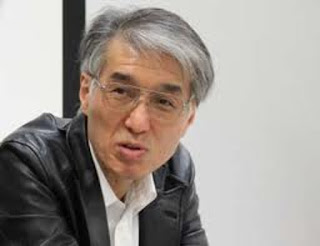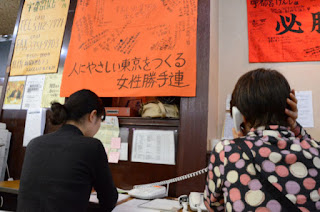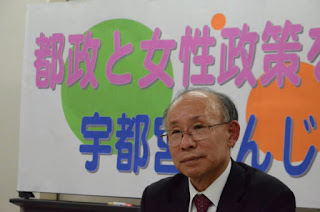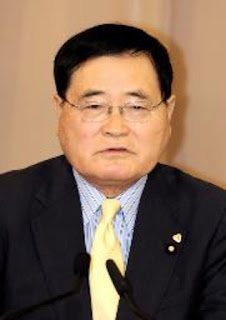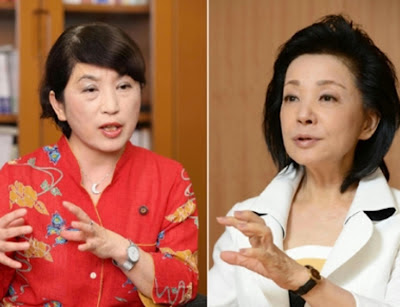Normal
0
10 pt
0
2
false
false
false
EN-US
JA
X-NONE
$([{£¥‘“〈《「『【〔$([{「£¥
!%),.:;?]}¢°’”‰′″℃、。々〉》」』】〕゛゜ゝゞ・ヽヾ!%),.:;?]}。」、・゙゚¢
After reading an article on interview with
Prof. Hiroaki Koide, I was surprised to learn that he shares the same opinion
that much.
I am different from him only in that he
says “We should eat contaminated good in order to save farmers.” It’s my understanding that Prof. Koide’s
mercifulness had him make a wrong judgment.
Masatoshi
Takeshita
December
2, 2012
Normal
0
10 pt
0
2
false
false
false
EN-US
JA
X-NONE
$([{£¥‘“〈《「『【〔$([{「£¥
!%),.:;?]}¢°’”‰′″℃、。々〉》」』】〕゛゜ゝゞ・ヽヾ!%),.:;?]}。」、・゙゚¢
Prof.
Koide November 29 “Nuclear Power Plants and Politics/Politicians”
Iwakami:
I do understand well that you don’t want to commit yourself to
politics. Apart from other policies, I’d
like to ask you what you think about nuclear power plant policy.
Koide:
Well, I don’t like politics. It is because people like Mr. Hashimoto are
politicians.
Iwakami: Oh!
Koide: In a word, he has no basic policy at all.
At one time, he said, “I’m against nuclear
power plants.” However, he easily ate
his words. He loves someone strong. He wants himself to be strong and loves
someone strong.
He curries favor with Mr. Ishihara who
seems to be stronger and cozies up to him, abandoning his commitment to
denuclearization. He seems to be that
kind of person. I
feel that as long as such person engages in politics, I have no hope for it. Therefore, I want to keep my distance from
politicians as much as possible.
Koide:
Although it is not a very nice way to put it, he
always says something to get to be popular among the public. If he considers it ineffective, he throws it
away. He thinks it realistic.
Iwakami:
I see. When he mentioned “to
abandon nuclear power generation,” he sensed how the public felt to win
popularity.
Koide:
He lacked coherence at the time of restarting the Ohi nuclear power
plant, too.
Yielding to the threat of “possible
blackout,” he made a slip of the tongue and said, “It is over” and “I’m
defeated.” We had no blackout. I thought that he should fight bravely. Well, it shows that he is such type of person
by his nature.
Iwakami: As for Mr. Shintato Ishihara, he
mentions not only the promotion of nuclear power generation but the discussion
about the possession of nuclear weapons.
The Senkaku territory issue came up. It was Mr. Shintaro Ishihara that ignited the
dispute. His remarks made the relations
with China soured and changed the domestic atmosphere.
In this situation, he quit the Tokyo
governorship and tried to embark on national politics. What is your
evaluation of his political stance?
Koide:
Mr. Ishihara loves someone strong much better than Mr. Hashimoto
does. I think
that he probably wants to control this country and also the world with power.
I think that his way of
thinking is basically wrong, and I have wanted people like him not to engage in
politics and my opinion is the same as before.
Iwakami:
Do you think that possession of nuclear weapons is realistically
possible?
Koide:
Yes, of course. “Use of nuclear
power plants for power generation, not for nuclear weapons” was the first
official reason, but to begin with, a prime reason for Japan to get involved in
nuclear power was for nuclear weapons.
Koide:
Some two years ago, NHK broadcasted a program “Japan
that needs nuclear weapons.”
It was a program which describes what
intention Japan had in the 1960s when the country rushed headlong into nuclear
power; the intention was clarified by collection of testimony of the diplomats
at the time, diplomatic documents and testimony of diplomats of a foreign
country, Germany.
“Japan should always be
prepared to have nuclear weapons” was Japan’s intention.
Then document says that it
should be made known to the public.
I think it indicates that
finally Japan has started teaching the public the fact that “Japan should also
have nuclear weapons.”
Iwakami:
The recent move toward this….
Koide:
Considering the fact that NHK produced such
program…
Iwakami:
The LDP also proposed to revise the Constitution and make the SDF the national
armed forces. These will lead to approving
the use of Japan’s right of collective self-defense, under which Japan can be
mobilized as U.S. subcontractor and also to putting an emphasis on “nuclear
weapons.”
What do you think of LDP’s
stance?
Koide:
They have had a consistent stance.
Koide:
The LDP wants to immediately revise the
Constitution. Especially Mr. Abe was at
the head of advocates of constitutional amendment. If LDP should take on the next
administration, Japan will direct its course all the more toward revising the
Constitution, never abandoning nuclear power and reviving it.
Iwakami:
For
example, the Senkaku Islands issue, the tense
relations between Japan and China or U.S. commitment to it. What do you think?
Koide:
All we have to do is to get back to the spirit of a constitution. Take for example the Constitution of Japan. As you know well, the
Article 9 says that “The right of belligerency of the state will not be recognized.”
The article prescribes clearly: In order to
accomplish it, land, sea and air forces will never be maintained. As Japan declares “it will ban the use of force as means of
settling international conflicts,” Japan only has to observe the constitution.
First of all, we have to stop being subject
state to any countries.
Iwakami:
It lasted only for a few days, but there was a move where each force got
together to form a third force of center-liberals.
A party was formed with Shiga
Governor Kada as leader and Mr. Tetsuya Iida as acting leader. The People’s Life First and the Anti-Nuclear
Power formed by Mr. Kamei and Mr. Yamada, which has not yet a political party, have
joined the party.
What do you think of this
move?
Or what do you think about Ms. Kada as
leader?
Koide:
In the two-party system, we had to choose either DPJ or LDP. However, either party is not good.
I think that we should immediately abandon
nuclear power. Either party is not
good. The party formed by Mr. Hashimoto
and Mr. Ishihara is not good, either.
Then I had wished
that some organization, where those who have tried to stop nuclear power plant
operation are accepted, could be created.
Therefore, I feel grateful for Ms. Kada who has created such organization.
To stop nuclear power plant operation is
not only the problem of nuclear reactors but relates to “what type of society
to build.” I’d like to thank her for
making it a top priority to “stop nuclear power plant operation.” I hope Ms. Kada and
others will participate actively in politics.
Iwakami:
Mr. Ozawa immediately disbanded his own party “People’s Life First” and made
an about-turn to join the Mirai no To (Tomorrow Party) which tried to form
alliances with this goal of getting Japan out of nuclear power.
What do you think of Mr.
Ozawa as politician?
Koide:
I originally dislike the strong.
So,…
Koide:
I think that a society seeking the strong is rotten
in the first place. Like Mr. Hashimoto
and Mr. Ishihara who want to get strong and yearn for the strong, many people
seem to “expect some strong leaders to appear.”
I think this is wrong. Rather, it
is important for each of us to live with clear self-awareness as sovereign
member of society. I think that “we
should not seek strong leaders.”
In that sense, Mr. Ozawa is one of strong
leaders.
As long as I hear his
recent comments, I think he is very respectable.
He is respectable because he has got to definitely
give his opinion and claim to “opposition to nuclear power.”
With regard to the current move, he swiftly
disbanded his party and decided to merge into Mirai no To, which tries to mobilize
people with policy centering on denuclearization. He is indeed a competent politician.
However, as I say many
times, I have no trust in politics. As he has engaged in politics for many years,
Mr. Ozawa might change his attitude in political world
in future. Therefore, I am not completely
free of uncertainty about him.

